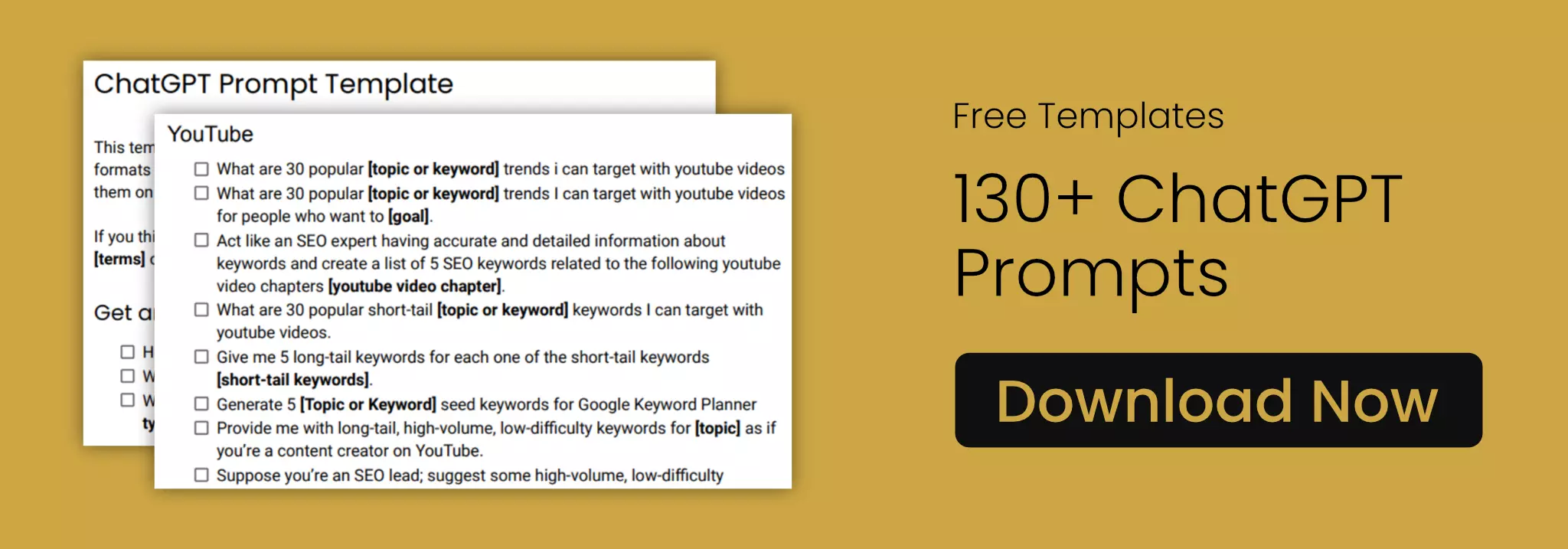ChatGPT For YouTube Keyword Research
Get YouTube keywords, DFY content, research data and much more. Download the ChatGPT Prompts Template!
Why Use ChatGPT For YouTube Keyword Research
Are you tired of creating high-quality YouTube videos only to have them go unnoticed?
The key for long-term growth is through effective keyword research.
In this article you will learn how to:
- Find topics and trends
- Come up with short-tail keywords
- Get long-tail keywords
- Analyze search intent
- Pick the best keywords based on data
- Use other advanced keyword strategies
As a content creator you know it's vital to get views and engagement.
These are two ranking factors that will help you rank higher but also get more clicks on your thumbnail.
By using the right keywords in your video:
- Titles
- Descriptions
- Tags
You can make sure your content appears in relevant search results and reaches your target audience.
With the help of ChatGPT you can streamline your keyword research and create videos that stand out.
Topics and Trends
ChatGPT is pre-trained and does not use live information. The information it provides is not always updated.
Yet you can still get ideas and content in a couple of different ways. You will still need to proof-read and correct it when needed.
Try to following prompt to get your first ideas:
What are 30 popular (topic or keyword) trends i can target with youtube videos
ChatGPT will give you trends about a certain topic for YouTube videos. It will try to provide you with:
- Recent topics (until data cut out)
- Developments (focus on change over time)
Here is a prompt example for YouTube Marketing:
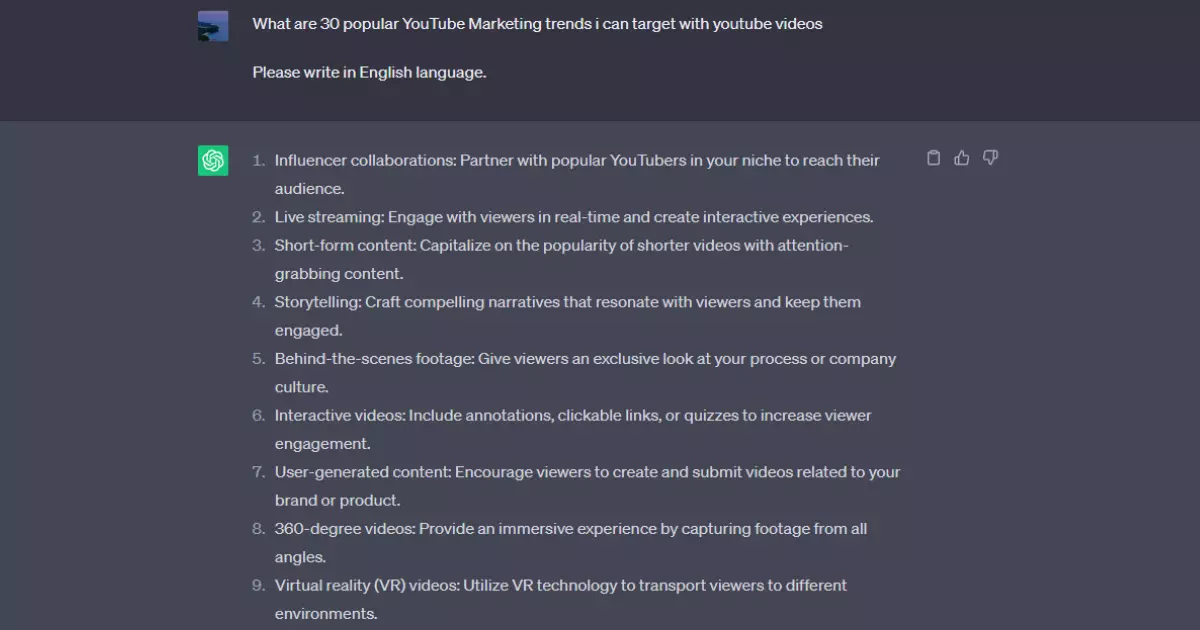
What are 30 popular YouTube Marketing trends I can target with youtube videos.
If you are entering a new niche you can get some idea about what type of content to produce as well:
For the example above – YouTube Marketing:
- Influencer Collaborations
- YouTube Shorts
- Educational Content
- Product Reviews
- Documentary Style Video
Want to go further? For each trend you will also be able to find different keywords using other prompts on this article.
To get keywords that are more relevant you can provide more context to ChatGPT:
- Specific goal of the video
- Target audience/ persona
- Product name/ type
What are 30 popular (topic or keyword) trends I can target youtube videos for people you want to (goal), for (persona).
You can also ask it to not deviate too much from the topic or provide more specific keywords. Otherwise it might provide broad match keywords (according to the type of content).
That also applies to other prompts. It's always possible to get more/ different results by changing the scope or range of your search.
Here is what a basic example would look like:
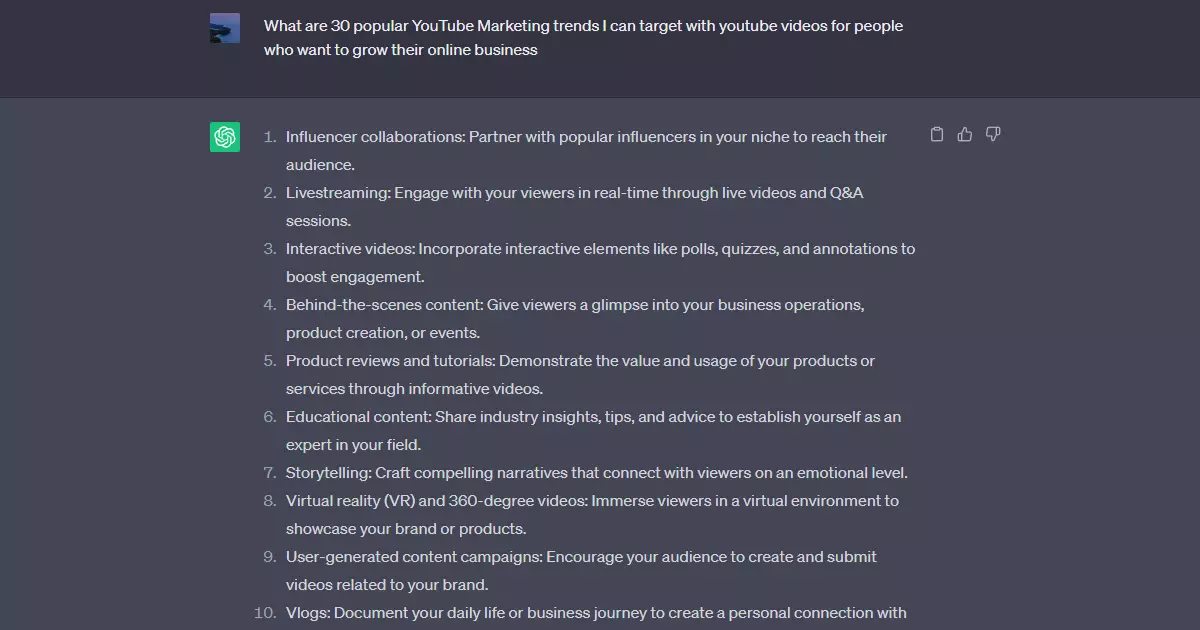
What are 30 popular YouTube Marketing trends I can target with youtube videos for people who want to grow their online business.
Keywords
Another use for ChatGPT is generating keyword ideas. You can then target those keywords with your youtube videos.
The best performing videos are those that strike a good balance between competition and volume.
In theory it seems like something easy to achieve. In reality, it's hard to execute as most keywords are already being targeted by other creators.
Sometimes you can find unique keywords by generating your own ideas and brainstorming from an initial list of broad keywords.
To start getting your first keyword ideas you can use the following prompt:
What are 30 popular (topic or keyword) keywords I can target with youtube videos?
I used the following prompt to see what the result would look like:
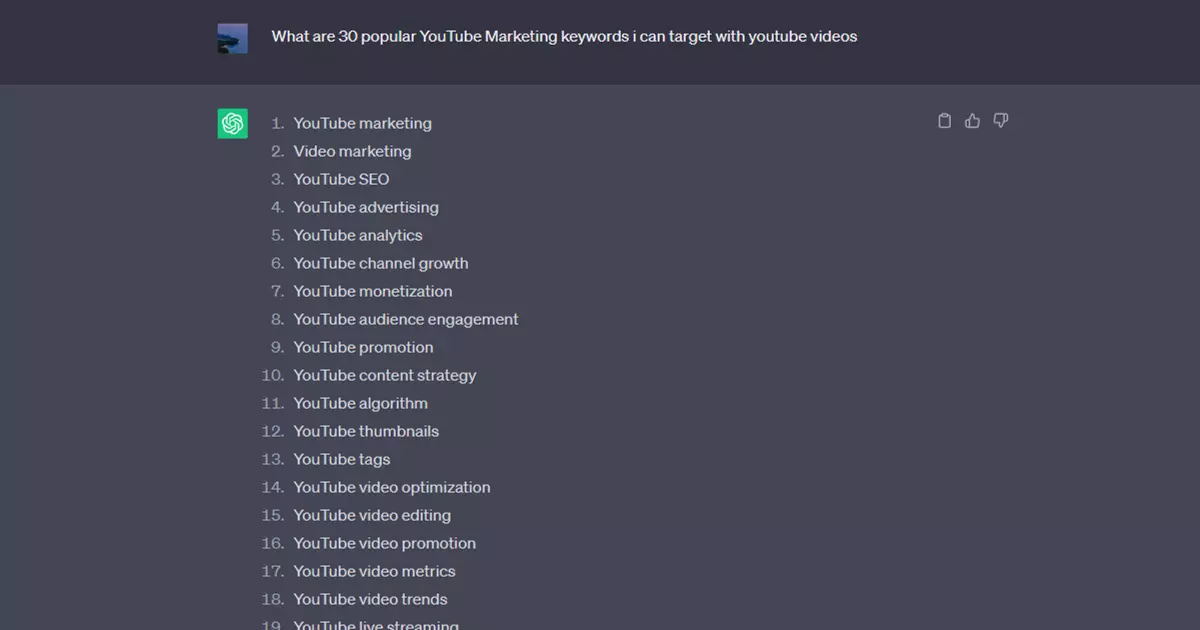
What are 30 popular keywords i can target with youtube videos
Some of the results i got made it to a sheet under the YouTube category:
- YouTube Marketing
- Video Marketing
- YouTube SEO
- YouTube Advertising
- YouTube Analytics
It's easy to make a mess with the amount and variety of results you get from entering a prompt. That's why I recommended creating a keyword map of some sort.
Making a list of broad short-tail keywords that branch out to long-tail keywords. And then they lead to specific content ideas or even video titles.
Feeling overwhelmed by the amount of keywords generated?
- Read them one by one
- Pick the very best
- Delete unrelated keywords
More Keywords
For more keywords you can always repeat the prompts:
Give me 30 more (topic or main keyword) keywords I can target with youtube videos.
To get some more output examples let's enter:
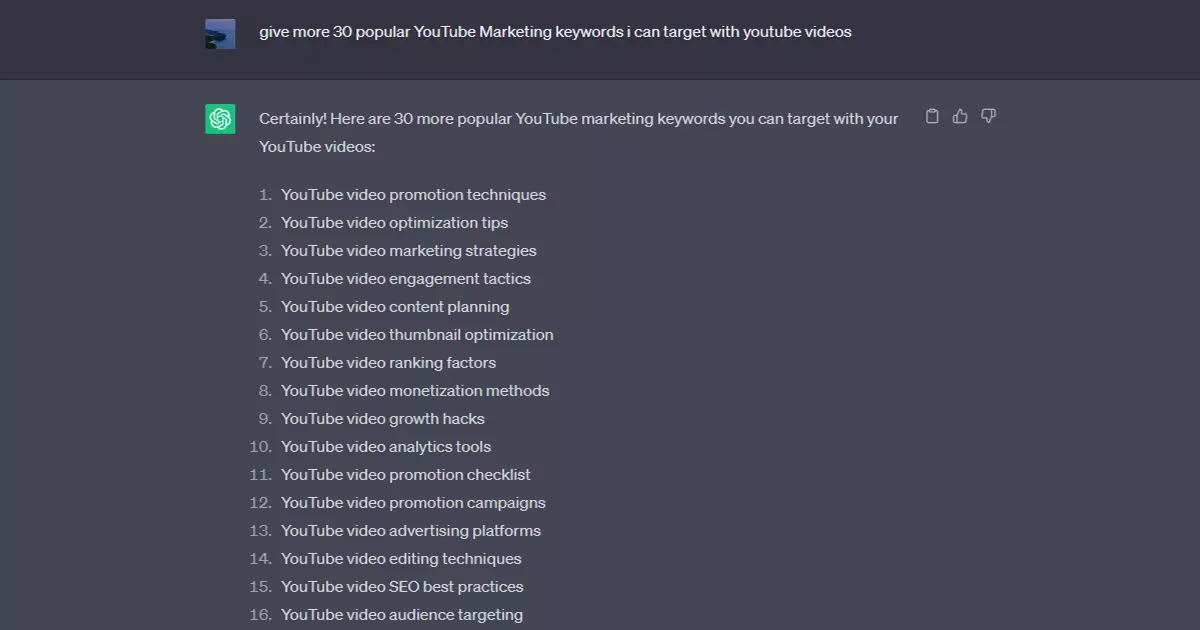
Give me 30 more youtube marketing keywords i can target with youtube videos.
Now we have some more interesting keywords:
- YouTube Promotion Techniques
- YouTube Optimization Tips
- YouTube Video Marketing Strategies
- YouTube Engagement Tactics
If you don't ask ChatGPT for long or short keywords it will keep providing both types of keywords.
These are all very good keywords you can target with youtube videos but not necessarily the final title… It's always possible to branch out!
You can change the original prompt to provide more results. You can also type something after the initial prompt like:
Give me more 30
You will still get 30 more keywords. ChatGPT is aware of your previous queries and can answer given that context.
Keywords From Existing Content
Getting ideas out of nothing is useful if you are lacking some creativity at any particular moment.
But it's also possible to get keywords from existing content:
Act like an SEO expert having accurate and detailed information about keywords and create a list of 5 SEO keywords related to the following youtube video chapters (youtube video chapters)
Not only can you get keyword ideas, but also content ideas and titles as well.
Take a look at the following example to understand what i mean:
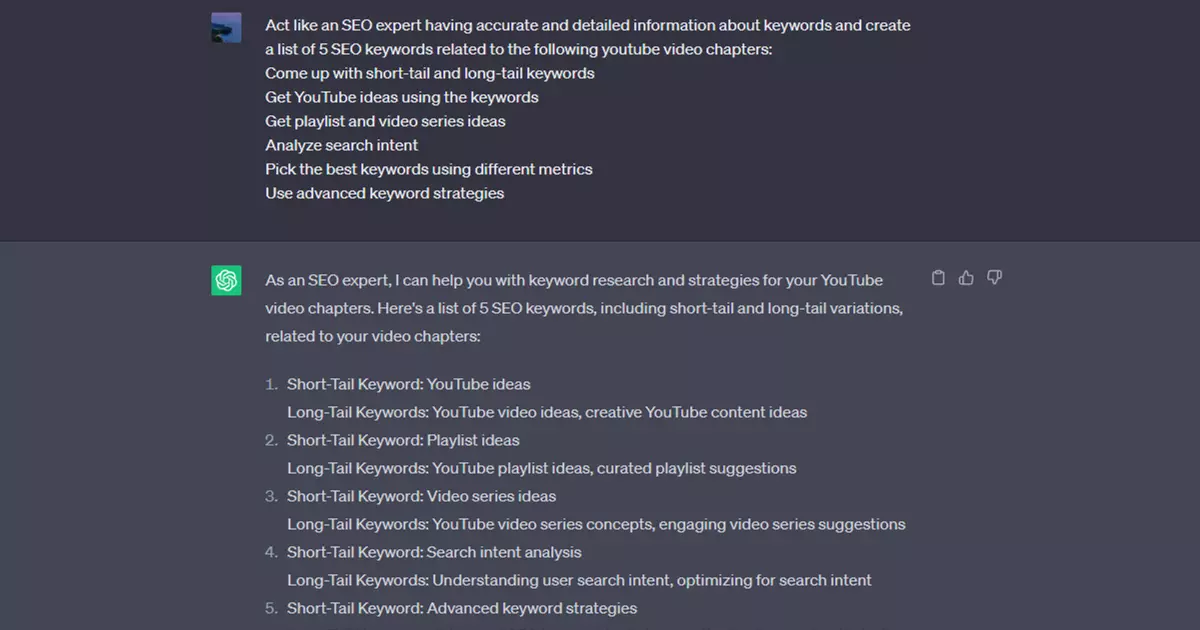
Act like an SEO expert having accurate and detailed information about keywords and create a list of 5 SEO keywords related to the following youtube video chapters:
Come up with short-tail ideas using short-tail and long-tail keywords
Get YouTube Ideas using the keywords
Get playlist and video series ideas
Analyze search intent Pick the best keywords using different metrics
Use Advanced keyword strategies
It will use youtube video chapters from a specific video to get a list of 5 related keywords.
I ended up with a wierd output. The first 5 results seem to be working. The rest seem to be giving tips rather than the actual keywords.
When this happens you can use the first 5 and tell ChatGPT that you wanted content in that format. And point out that it started going wrong after the 5th bullet point.
These are some keywords that might be interesting to include in your description, especially if it’s a longer video.
Short-Tail Keywords
A good first step to take is to start with short-tail keywords.
Keywords that can serve as main topics. Main topics on your visual representation of a keyword map or topic cluster.
Here's a variation of a previous prompt but instead targeting short-tail keywords:
What are 30 popular short-tail (topic or keywords) keywords I can target with youtube videos.
Replacing the place holder with YouTube Marketing:
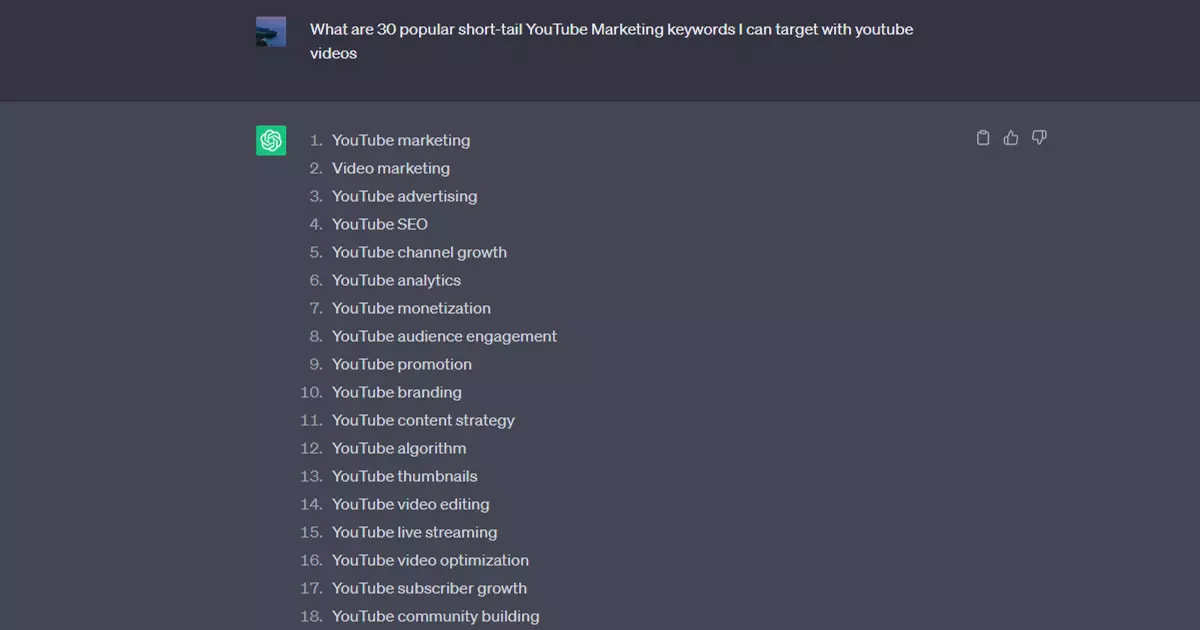
What are 30 popular short-tail YouTube Marketing keywords I can target with youtube videos.
Gives you tons of relevant YouTube marketing keywords:
- Video marketing
- YouTube Advertising
- YouTube SEO
- YouTube Channel Growth
And this is only the beginning. For each short-tail keyword you can do further research.
Ask for popular long-tail keywords for each one of the short-tail keywords:
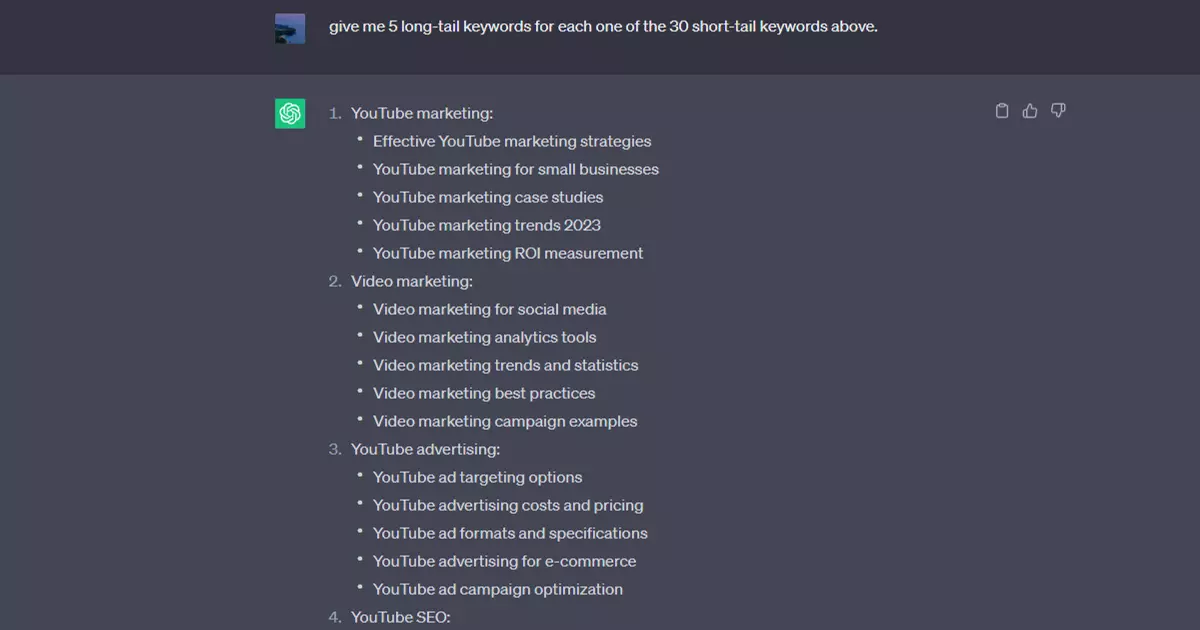
Give me 5 long-tail keywords for each one of the 30 short-tail keywords above.
Now you can start building a keywords map:
- YouTube Marketing Strategies
- YouTube Marketing For Small Businesses
- YouTube Marketing Case Studies
- YouTube Marketing Trends
- YouTube Marketing ROI
Under YouTube marketing you can place the long-tail keywords on a sheet or a topic cluster.
Google Keyword Planner
Depending on the topic or purpose of the keywords you may get different results. Let's say you want to use Google Keyword Planner to find more keywords.
You can ask ChatGPT to:
Generate 5 (Topic or Keyword) seed keywords for Google Keyword Planner
Replacing (Topic or Keyword) with YouTube Marketing:
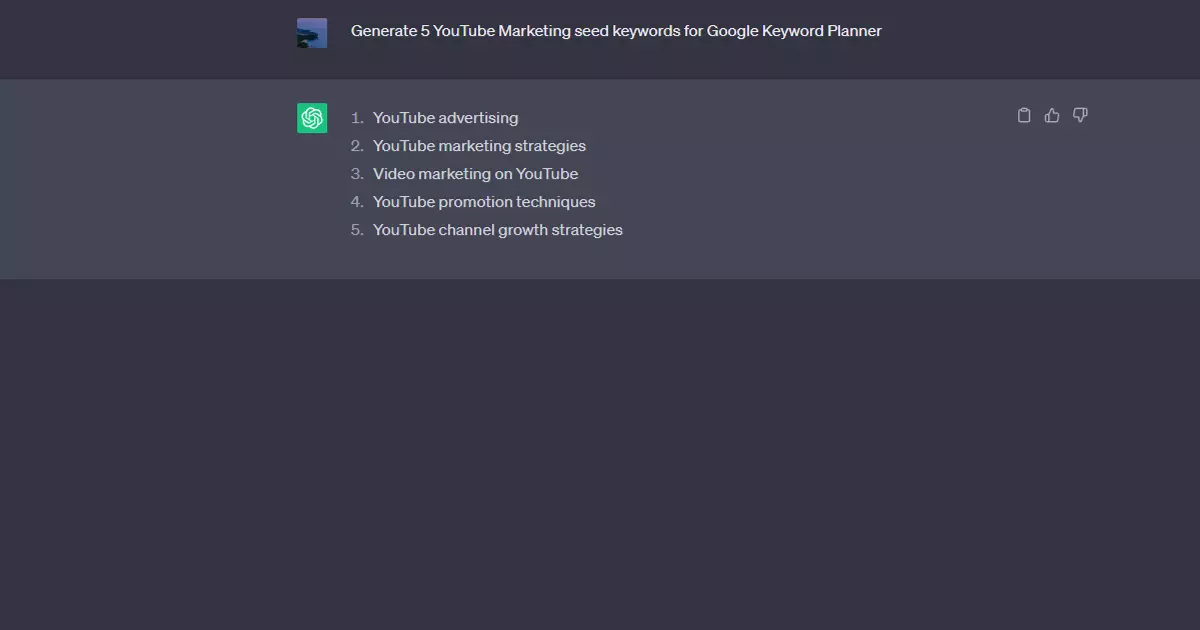
Generate 5 YouTube Marketing seed keywords for Google Keyword Planner
Got me some seed key phrases:
- YouTube Advertising
- YouTube Marketing Strategies
- Video Marketing on YouTube
- Video Marketing on YouTube
- YouTube Promotion Techniques
- YouTube Channel Growth Strategies
You can use your own list of seed phrases by copy-pasting them to Google Keyword Planner and generate a list of related keywords.
Plenty of filters available to narrow down the list and get more relevant results. Google Keyword Planner is a great starter. For more accurate data consider a keyword tool like Mangools.
Long-Tail Keywords
Long-tail keywords are more specific and have less competition. You can refer to the short-tail keywords we explored earlier.
By leveraging these short-tail keywords, you can get longer, more specific keywords.
Those long keywords cater to particular topics or cover many subtopics.
Rank many YouTube videos for long-tail keywords. Your videos will also be visible to users searching using related short keywords.
First prompt example:
Provide me with long-tail, high-volume, low-difficulty keywords for (topic of interest) as if you’re a content creator on YouTube.
The example I have used to get outputs:
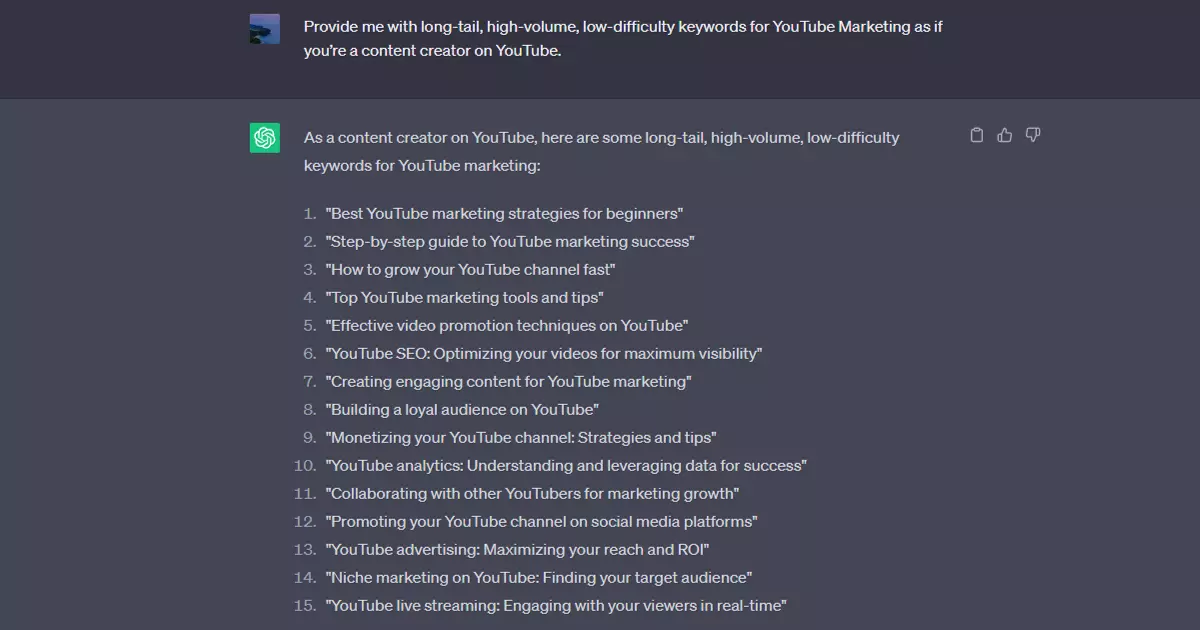
Provide me with long-tail, high-volume, low-difficulty keywords for YouTube Marketing as if you’re a content creator on YouTube
Some of the examples can work as youtube video titles without too much editing or rewriting:
- Best YouTube Marketing Strategies For Beginners
- Step-by-step guide To YouTube Marketing
- How to grow your youtube channel fast
- Top YouTube Marketing Tools
An alternative prompt:
Suppose you’re an SEO lead; suggest some high-volume, low-difficulty keywords for (topic of interest) I can target with YouTube videos.
Using “Content Marketing” as the topic…
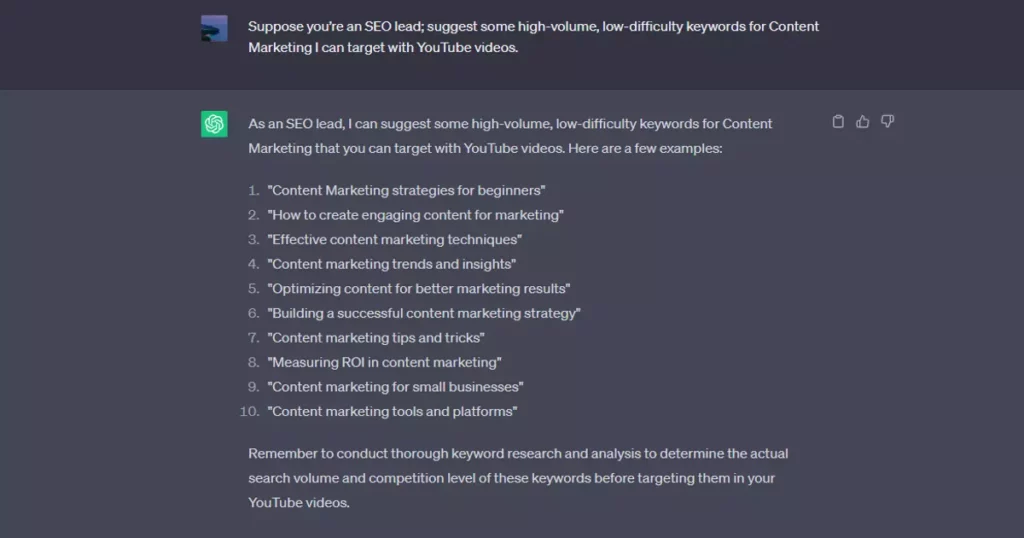
Suppose you’re an SEO lead; suggest some high-volume, low-difficulty keywords for Content Marketing I can target with YouTube videos.
Long-tail keywords generated:
- Content Marketing Strategies For Beginners
- How To Create Engaging Content For Marketing
- Effective Content Marketing Techniques
- Content Marketing Trends and Insights
- Optimizing Content for better marketing results
Another way to find long-tail keywords is to target questions your audience looks up on:
- Quora
- Forums
If you answer those questions you will have a super targeted piece of content.
It’s much easier to use ChatGPT instead of using a tool like AnswerThePublic (also saves time and money). Although those tools are usually more accurate.
Combining both can also be a great idea and you can feed those questions to ChatGPT and ask for similar ones.
Prompt to generate questions:
As a content strategist, create a compilation of (topic) frequently asked questions that are pertinent for the new visitors.
Example for the “Crypto” topic:
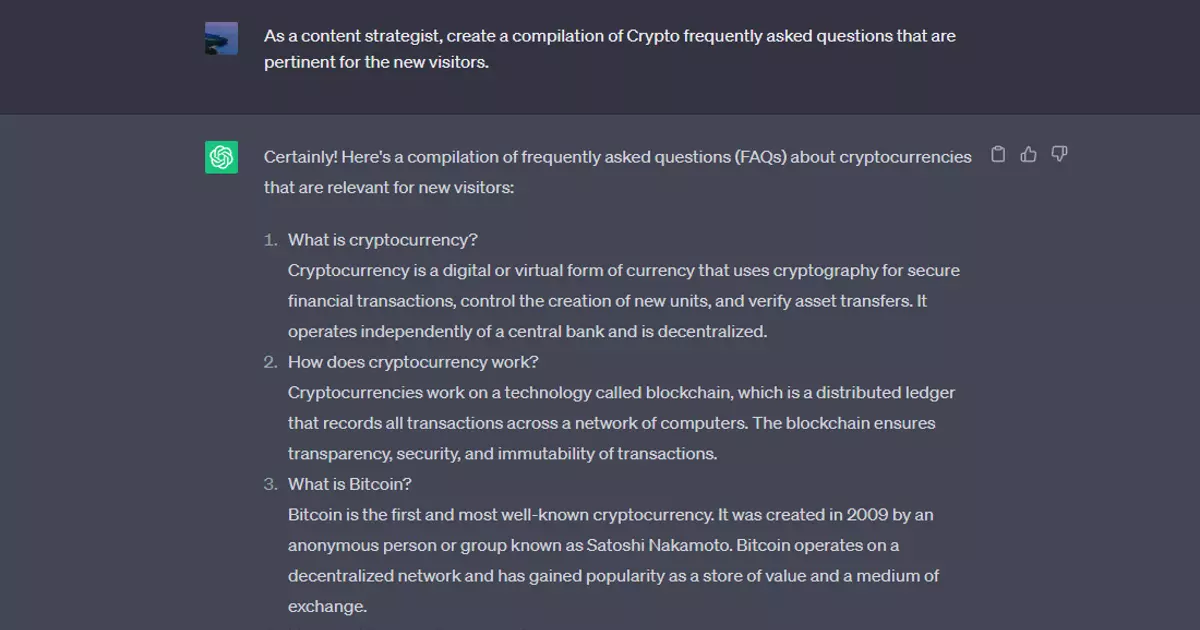
As a content strategist, create a compilation of Crypto frequently asked questions that are pertinent for the new visitors.
Some interesting questions I got back:
- What is cryptocurrency?
- How does cryptocurrency work?
- What is Bitcoin?
- How can I buy cryptocurrency?
Good potential keywords you can target with short-format educational videos that explain concepts. For more ideas you can always branch out.
For example, for “How does cryptocurrency work”:
- How does bitcoin work?
- How does ethereum work?
- How do smart contracts work?
“How can i buy cryptocurrency”:
- How can I buy cryptocurrency without KYC?
- How can I buy cryptocurrency with a credit card?
- How can I buy cryptocurrency on Binance?
On that note, you can also get keywords for “Top 10” type of videos by using the prompt:
Suppose you’re a keyword researcher, create a list of listicle content keywords about (topic).
This time I chose the “PPC” (Pay Per Click) topic:
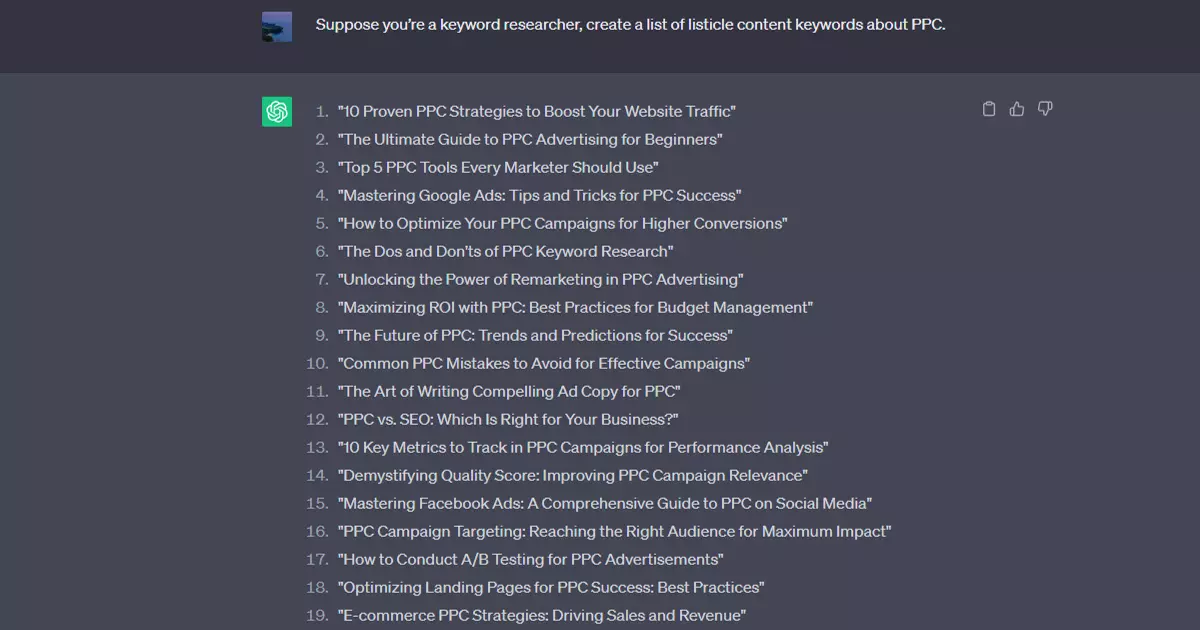
Suppose you’re a keyword researcher, create a list of listicle content keywords about PPC.
These two outputs were exactly what I was looking for:
- 10 Proven PPC Strategies
- Top 5 PPC tools every marketer should use
Round up videos can be great for people looking to buy products or for longer educational videos.
Want both topics and longer keywords? (can even become your video titles). Try the following prompt:
You’re an online marketing manager, make a list of broad topics relevant to (topic) and expand each topic with a list of phrases you think your customers use.
Let's try it with “ai copywriting”
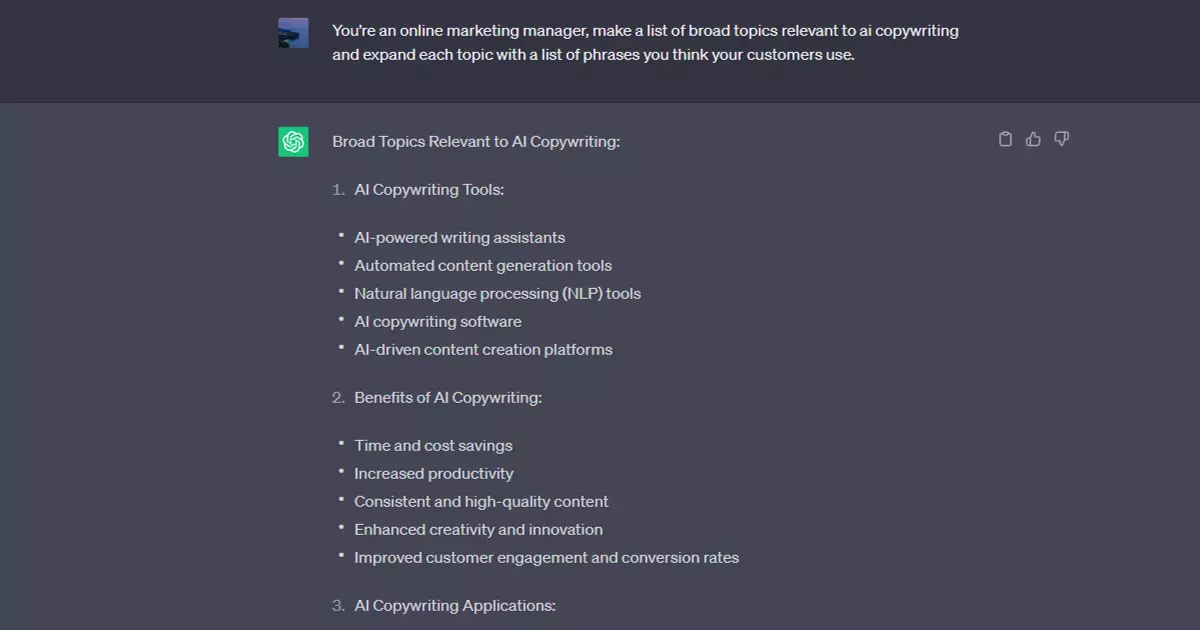
You’re an online marketing manager, make a list of broad topics relevant to ai copywriting and expand each topic with a list of phrases you think your customers use.
It will give broad topics but also some relevant keywords all at once:
- AI Copywriting Tools
- Benefits of AI copywriting
- AI Copywriting Apps
- AI Copywriting Best Practices
You can use the broader topics and then get more keywords about that broad topic. Don't forget to add them to your keyword map.
YouTube Ideas From Keywords
If you tried some of the previous prompts, you will already have a ton of keywords. But what about actual YouTube titles or content you can create?
Now that you have the keywords you can use them to get titles by using the prompt:
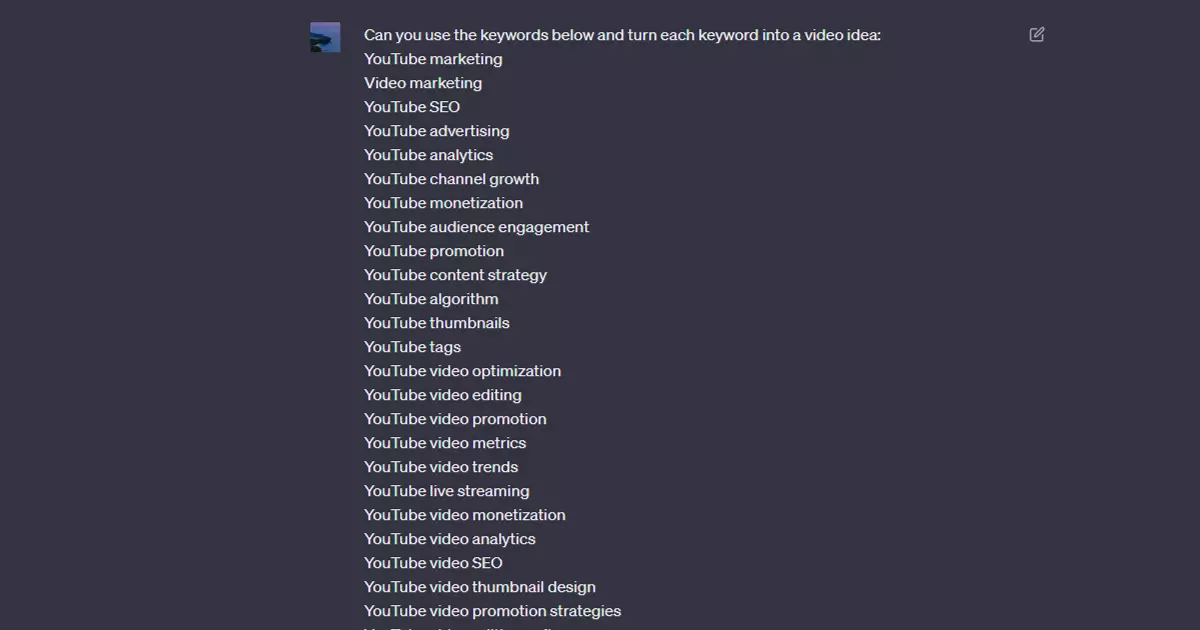
Can you use the keywords below and turn each keyword into a video idea: (Keyword List)
This way you will be getting great video and title ideas. Titles that include Keyword + Topic* and combine short-tail with long-tail keywords as well!
I got plenty by entering my own keyword list:
- Mastering YouTube Marketing: Strategies For Success
- Unlocking the Power of Video Marketing on YouTube
- Boosting Your YouTube Visibility with SEO Techniques
- Effective Advertising on Youtube: Reaching your Target Audience
- Understanding YouTube Analytics: Data-driven insights for Growth
Another way to go about it is to get ideas for each individual keyword or topic:
Can you give me 10 youtube video ideas for (topic or keyword)
Let's generate some video ideas for the keyword “YouTube Video Optimization”:
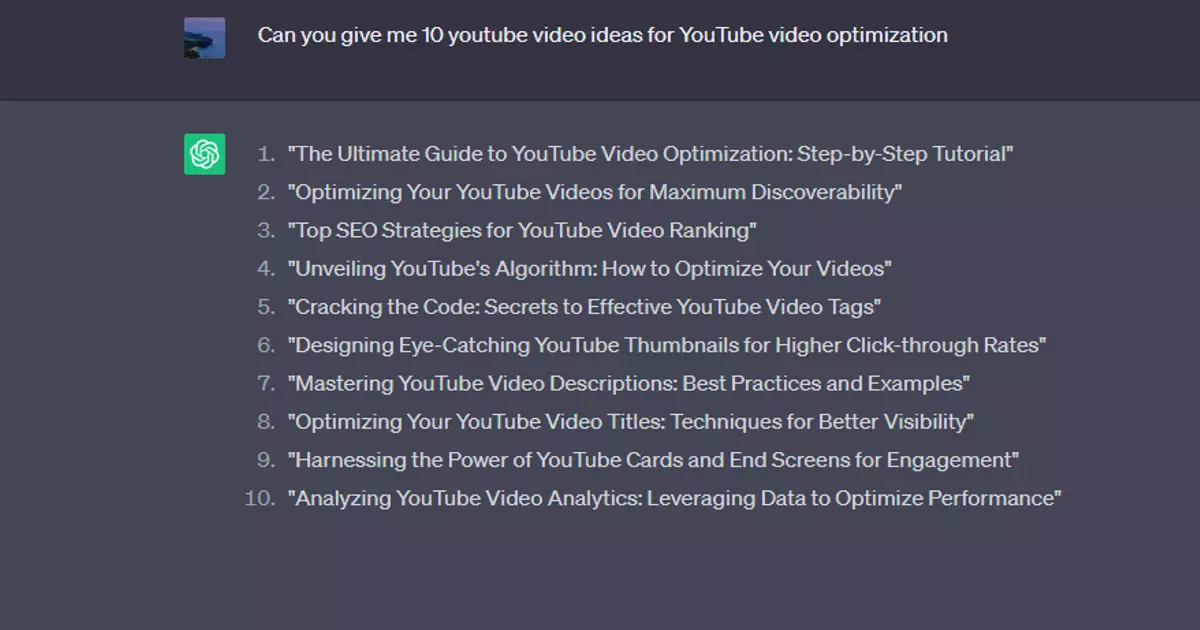
Can you give me 10 youtube video ideas for YouTube Video Optimization
As a result I got very appealing videos ideas:
- The Ultimate Guide to YouTube Video Optimization: Step-by-step Tutorial
- Optimizing Your YouTube Videos For Maximum Discoverability
- Top SEO Strategies for YouTube Video Ranking
- Cracking the Code: Secrets to Effective YouTube Video Tags
- Designing Eye-Catching YouTube Thumbnails for Higher Click-through Rates
The previous two prompts will work fine for general ideas on all types of YouTube videos. There are some prompts that might work better for different styles or video types.
If you want to:
- Create a list of top 10 style videos
- Get resources
- Get brand keywords
You can ask ChatGPT for the best resources on that topic:
What are the 5 best (Topic or Keyword) (category)
Replacing the placeholder by a relevant keyword will give you the best results. By relevant I mean – something that you think will work well with listicle content.
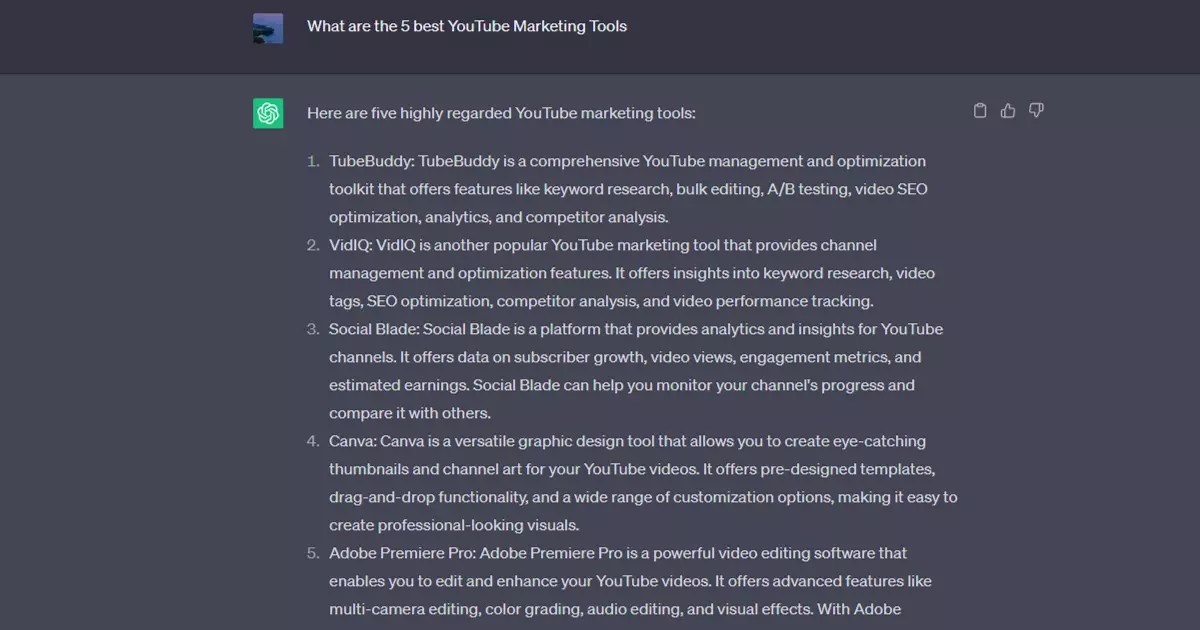
What are the 5 best YouTube Marketing Tools
Followed by the prompt I got the following list of tools:
- TubeBuddy
- VidIQ
- Social Blade
- Canva
- Adobe Premiere
With said list of tools, I could create many videos covering different aspects of each one of these tools. Ranking for short and long-term keywords.
But of course, the most obvious option would be to create a video with the title “5 Best YouTube Marketing Tools”.
These can be great keywords to promote those products as well so keep that in mind.
Search Intent
At this point, you can revisit your keyword list and ask ChatGPT to analyze the search intent of those keywords:
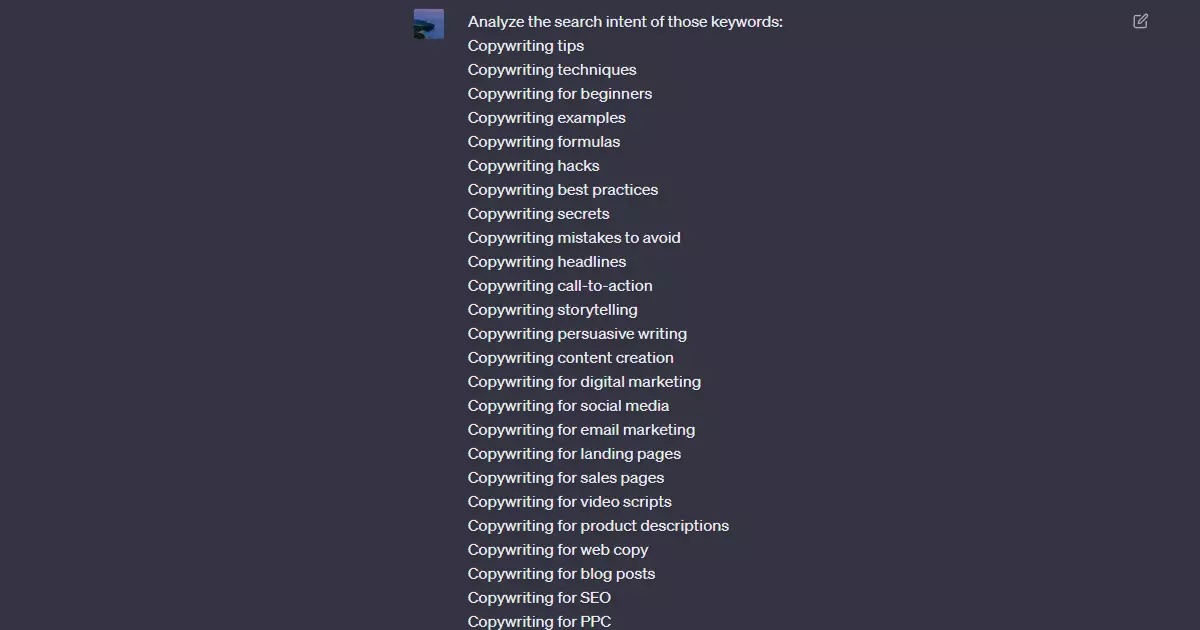
Analyze the search intent of those keywords: (Keyword List)
But that will sometimes give a very extensive as the example bellow illustrates:
- Copywriting tips: Users are seeking general advice or suggestions to improve their copywriting skills.
But if you don’t need all those details you can ask it to use shorter categories to sort the keywords based on search intent.
I like SEMRush default search intent categories, but you don't have to use those if you fill like some are more important than others or want to follow a different method.
According to SEMRush:
- Navigational intent: Users want to find a specific page.
- Informational intent: Users want to learn more about something.
- Commercial intent: Users want to do research before making a purchase decision.
- Transactional intent: Users want to complete a specific action.
For the example prompt I used only 3 of those categories:
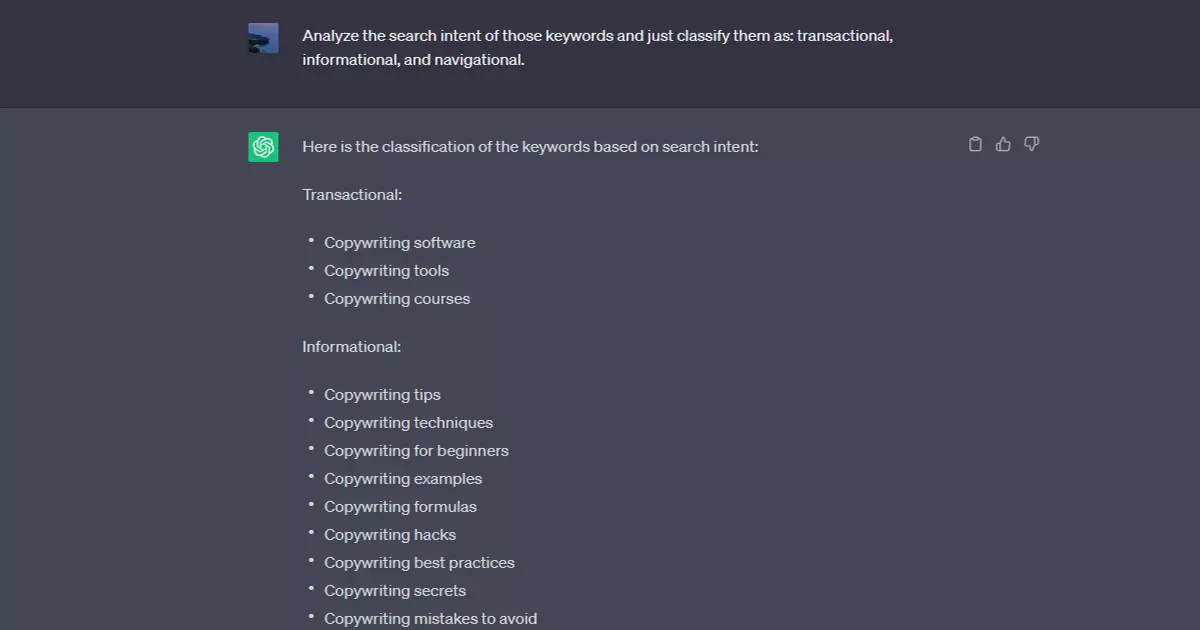
Analyze the search intent of those keywords and classify them as: transactional, informational, and navigational.
According to the categories you want to use, the ai will give you a list with the keyword followed by the category, or vice versa. It's always possible to change the data format later on.
In this case you would get a list of all Transactional, Informational and Navigational keywords:
- Copywriting Software – Transactional (people looking to buy)
- Copywriting Tips – Informational (people who want to learn more)
- No Navigational keywords in this case
In the context of YouTube Keyword Research and SEO it can be very useful for creating laser focused videos. Videos for specific use cases, type of viewer and even monetization.
Organize and Sort
ChatGPT can also analyze existing keyword data. Provide a list of keywords to ChatGPT and tell it to pick the very best based on:
- Relevancy
- Competition
- Volume
- Cost Per Click
- Search Intent
With that data you can then request the best keywords according to:
- Best low competition keywords
- Best high volume keywords
- Best short tail keywords
- Best long tail keywords
- Balance between previous metrics (average)
Given that information and a specific prompt you can get a ranking or a report based on the data you collected.
What to make a presentation for clients? YES you can ask ChatGPT to do that too… Or at least an outline and some visual ideas.
You can also ask chatgpt for keywords that already include that data. It may not always be very accurate when compared to external keyword tools.
Notice how you can slightly change the next prompt to use ChatGPT as a source or existing data:
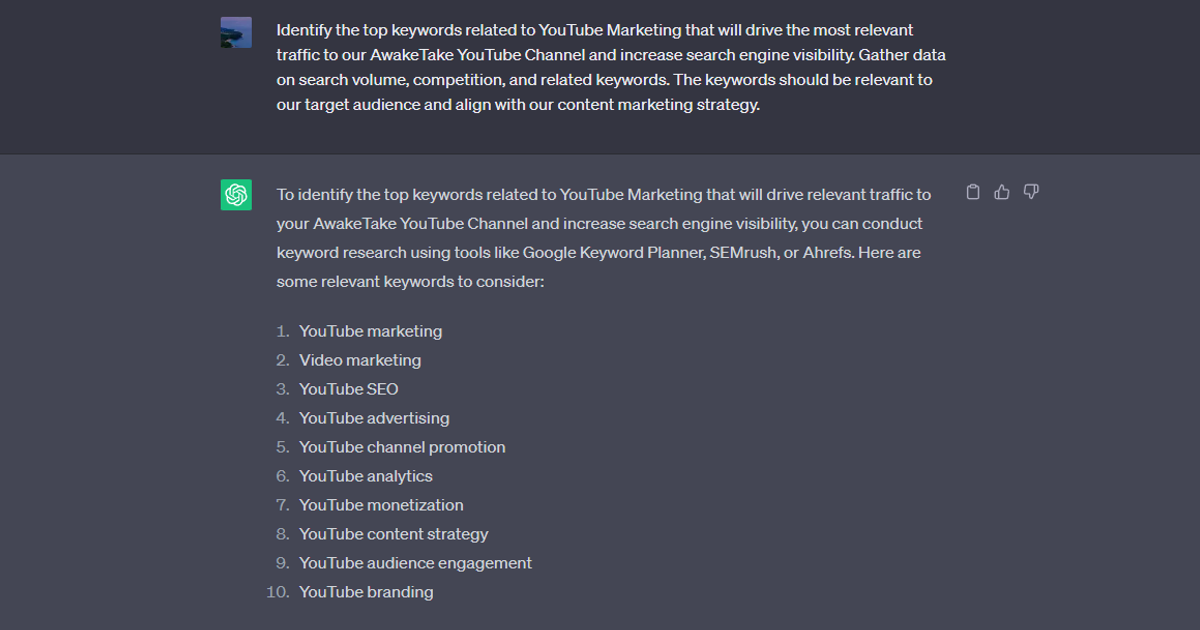
Identify the top keywords related to YouTube Marketing that will drive the most relevant traffic to our AwakeTake YouTube Channel and increase search engine visibility.
Gather data on search volume, competition, and related keywords. The keywords should be relevant to our target audience and align with our content marketing strategy.
Instead of “Gather data” you can swap it for
- “Use this data”
- “Use the data below”
- “Use the previous keyword list”
This will only work if you provide the actual list with competition and volume. Sometimes ChatGPT will refuse to provide this info by itself, as it gets updated.
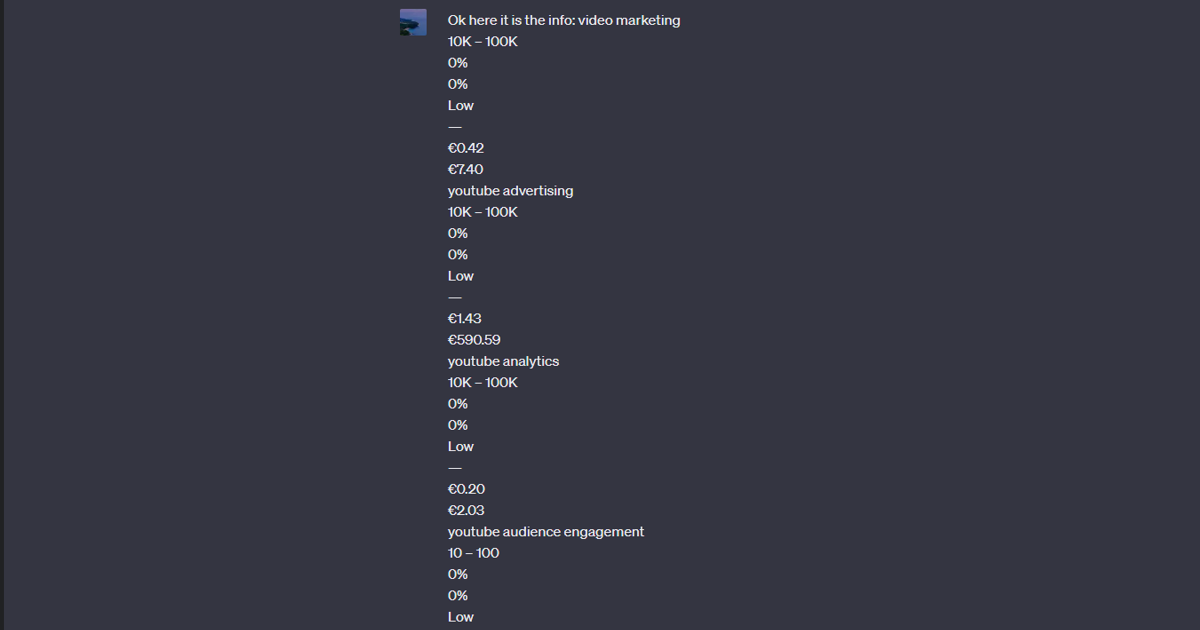
Some keyword research tools that might be useful:
The last two are YouTube specific and not keywords research tools (YouTube Optimization).
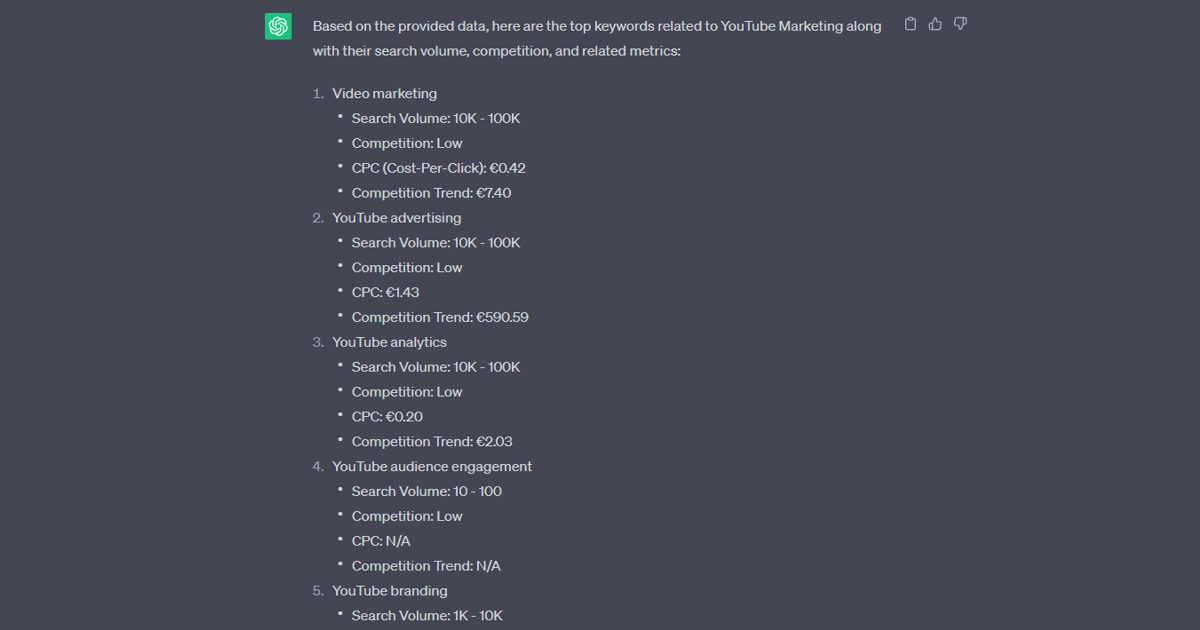
Here is a keyword research data sample:
- Video Marketing
- Volume: 10K – 100K
- Competition: Low
- YouTube Advertising
- Volume: 10K – 100K
- Competition: Low
- YouTube Analytics
- Volume: 10K – 100K
- Competition: Low
Sometimes it might be better to present information in a table instead of raw data. For that use case you can use the prompt:
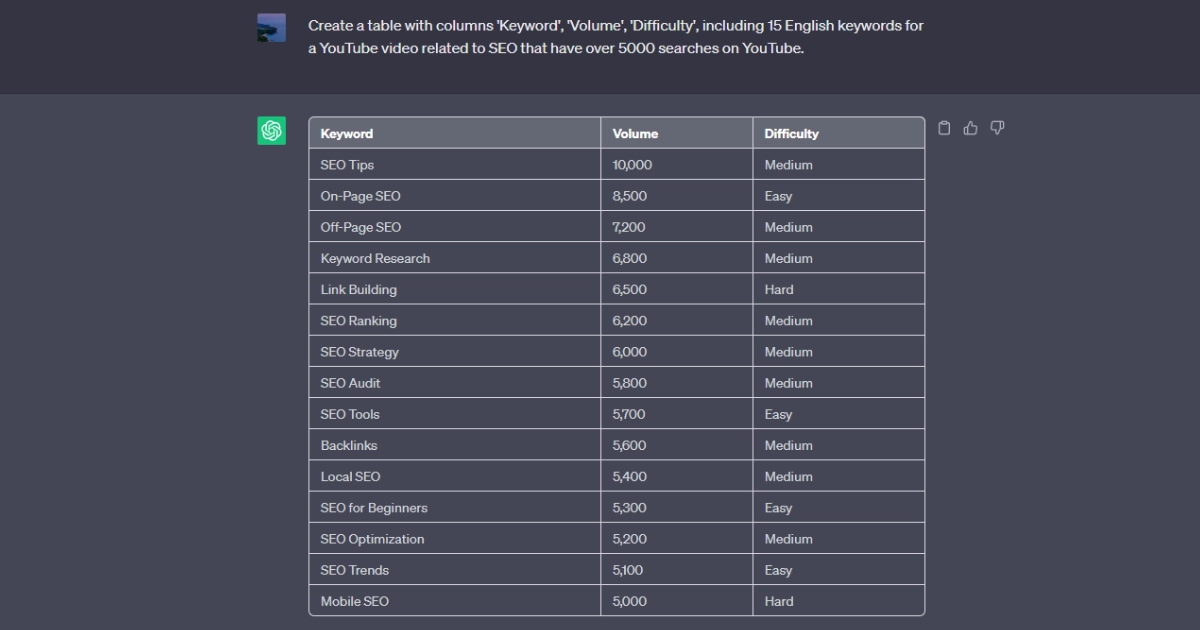
Create a table with columns ‘Keyword', ‘Volume', ‘Difficulty', including 15 English keywords for a YouTube video related to (Topic or Keyword) that have over 5000 searches on YouTube.
What if you want to answer questions like…
- Which of these keywords would be better for reach?
- Which would be better to produce content according to the search intent?
- Which would be better for promoting products?
- Which would be better affiliate links on youtube?
Well, you can ask those questions and get a quick answer from your personal ai assistant.
We have already gone through the search intent data collection. These are some of the ways to use it but not the only ones.
Here’s a Table with the keywords on the first row, volume on the second, followed by difficulty on the last row:
(Enter Image Here)
Consider using these prompts if you want to:
- Plan videos later on that target certain keywords
- Decide which are better for promotion and what others aren’t as good
- Provide exactly what the viewer is looking for.
Want a batch of work cut out for you? Try this huge prompt:
As a keyword researcher, generate 15 relevant long-tail keywords in 1-5 words for a given primary keyword based on user search intent on YouTube.
Present the results in a table format, including high volume and low difficulty metrics.
Additionally, generate hashtags for the researched keywords, removing spaces between them.Provide two keyword-optimized titles for YouTube and suggest thumbnail content for (Video Title).
Replacing with “ChatGPT For YouTube Keyword Research”:
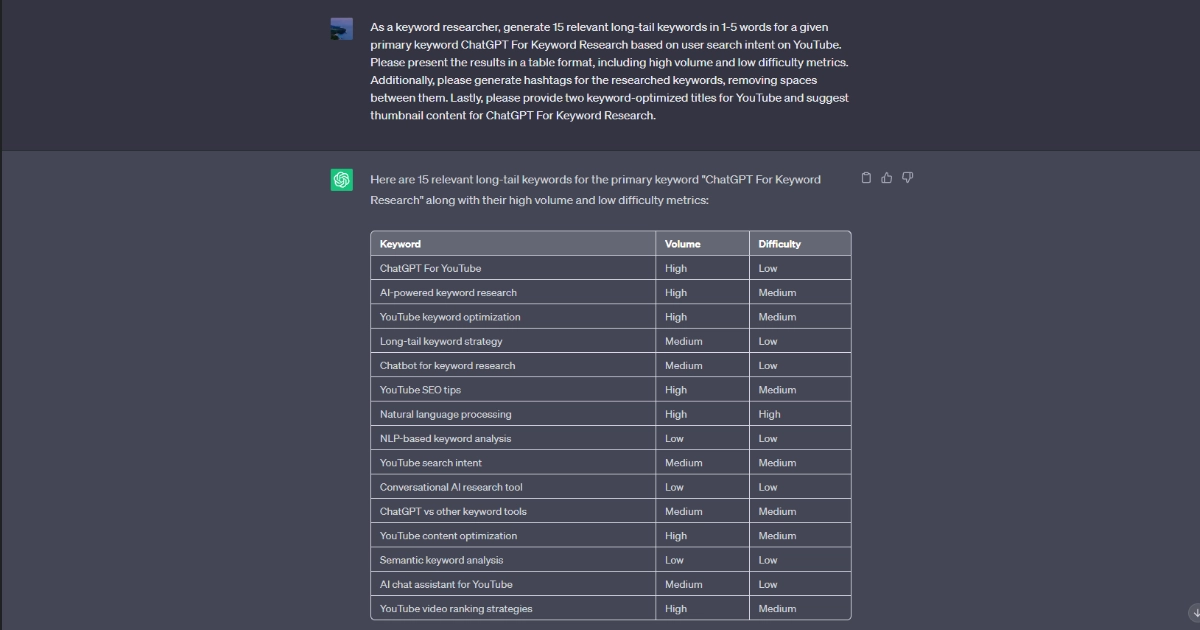
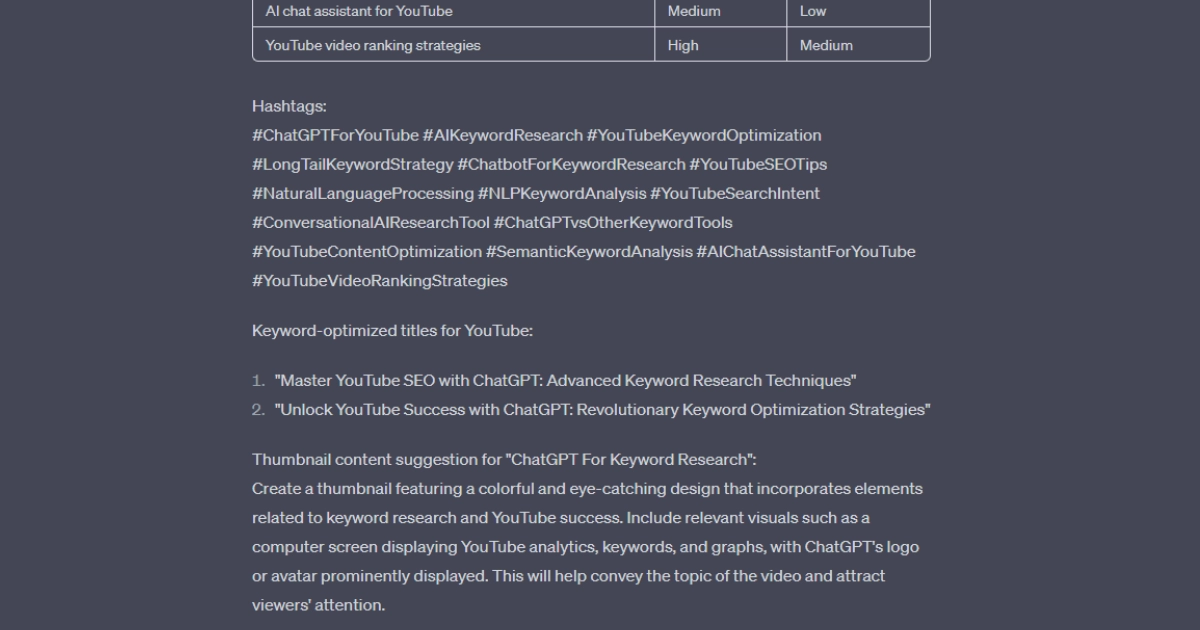
As a keyword researcher, generate 15 relevant long-tail keywords in 1-5 words for a given primary keyword ChatGPT For Keyword Research based on user search intent on YouTube.
Present the results in a table format, including high volume and low difficulty metrics.
Additionally, generate hashtags for the researched keywords, removing spaces between them.
Provide two keyword-optimized titles for YouTube and suggest thumbnail content for ChatGPT For Keyword Research.
Keyword Strategy
Having trouble getting everything organized? Then you can create:
- Tables with all your research,
- Keyword blueprint maps
- Sort keywords
Let’s say you want a list of main keywords you can target and also their search intent. You can use the following prompt:

Act as an SEO manager and research the top 10 SEO keyword strategies for (topic).
Organize the search intention (commercial, transactional, or informational) for the listed keywords in a table format.
Replacing the topic with Crypto got me some results. Some of them were:
- Cryptocurrency: Informational
- Cryptocurrency Exchange: Transactional
- Best Cryptocurrency Investments: Commercial
What about competitive research? You can figure out what are your main competitors or similar channels.
Give me a table of the top youtube competitors for (Topic) and their URLs curated by a keyword strategist.
I was curious about what would the most popular crypto channels and so I used the following prompt:
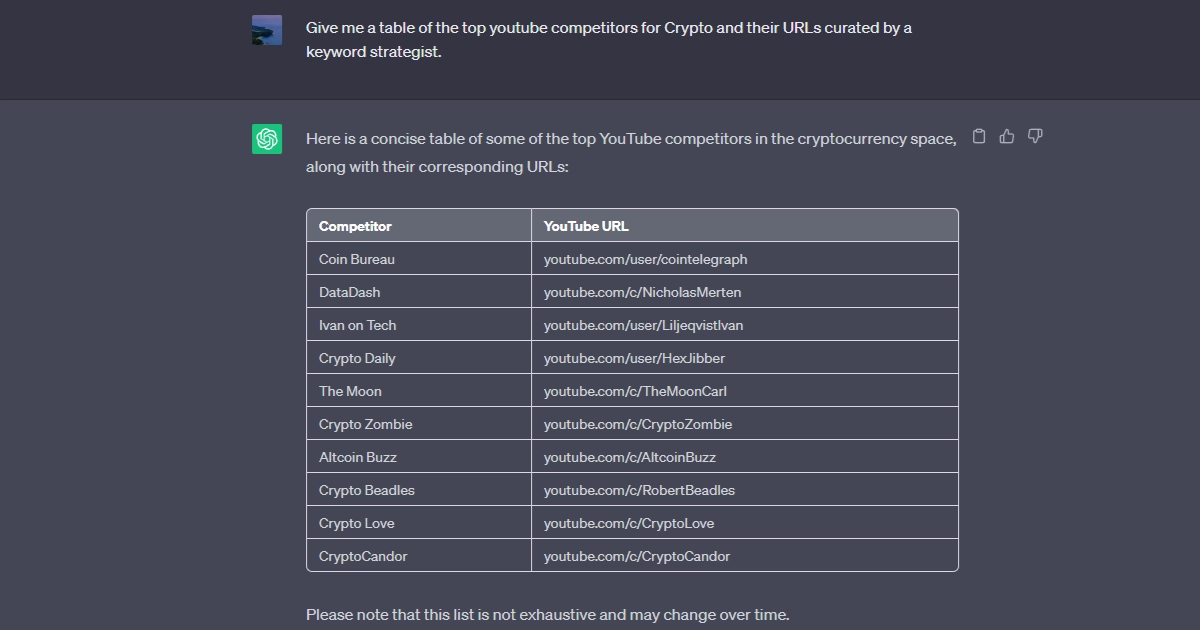
Give me a table of the top youtube competitors for Crypto and their URLs curated by a keyword strategist.
The list I got:
- Coin Bureau
- DataDash
- Ivan on Tech
- Crypto Daily
Then you can do with that what you will. From getting:
- Keywords
- Tags
- Content ideas,
- Learning from them
- Getting inspiration for your video editing
Get The Prompt Template
I hope these chatgpt prompts will help you with your keyword research. For me it made the difference between having some ideas to having so many that’s even hard to track!
There are many ways to organize keyword research and SEO data but that is a whole different topic to cover.
Creating a keyword map or blueprint can go a long way especially if categorized. You will end up with the most important keywords only.
Brainstorming or mind maps can also help if you want to get more:
- Keyword variations
- Very specific keywords
Another great resource you can use is the ChatGPT Prompt Template. It contains all the prompts mentioned in this article and more. Don't forget to get your own copy.

